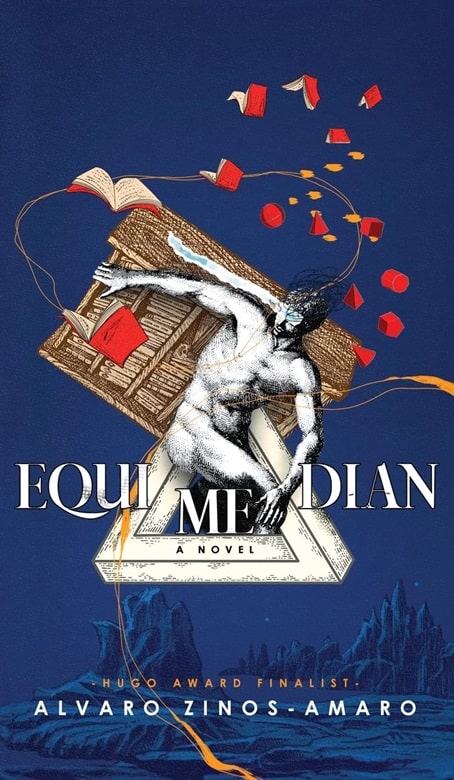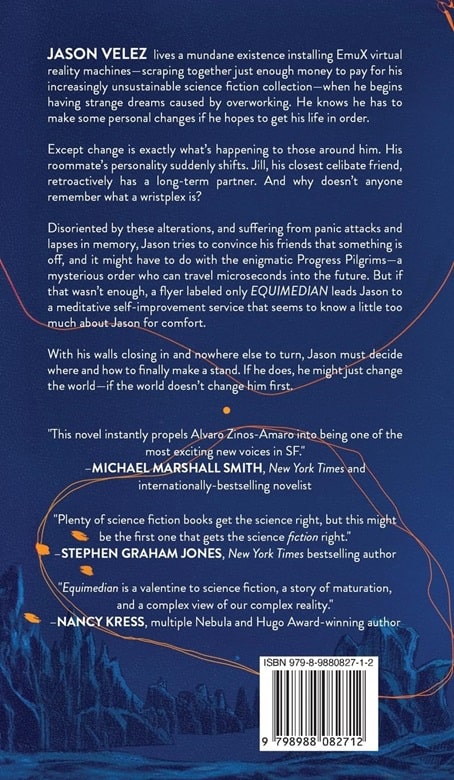Triangulating Moving Targets: Equimedian
 |
 |
Equimedian (Hex Publishers, February 6, 2024). Cover artist unknown
When we first meet Jason Velez, the protagonist of my alternative-1970s novel about science fiction, fandom, and the unskeining of reality itself, he’s in a bad way. By the end of Equimedian’s first chapter, he enumerates seven things he wants to change in his life. The list kicks off with a call to action to sell off the bulk of his SF paperbacks. The reasons Jason offers seem straightforward enough: he needs cash, and he’s tired of hauling around thousands of books.
But is there more to it than that?
Owners of collections can probably relate to the idea that assortments of objects may over time take on a certain “weight” — they require space, maintenance, curation, some kind of ongoing investment of energy and time to buffer them from entropy and keep them as evergreen as possible. Reasonably, we might speculate that this abstract sense of burden could be part of Jason’s motivation for wanting to do away with most of his book hoard. He’s going through a hard time, feeling bogged down by life, constrained. Parting with his collection could, perhaps, make him lighter, a bit more free.
As soon becomes evident in the novel, Jason tends to process a lot of his experiences through his reading material. He relies on stories to cope with reality; fiction as fixation. Like anyone suffering from a dysfunction brought about by a dependency, letting go of his books might equate in his own mind to a kind of victory over himself. Personal growth, if you will.
And — there might still be something else at work.
Beyond his existential woes, pertaining mostly to his job and support system, Jason suffers from a visual disability, one that has recently been flaring up.
Reading is now a direct confrontation with this encroaching limitation. What if he loses that ability altogether? His huge personal library might then represent a painful reminder of how things once were. He might have people help him by reading aloud, or learn to decode Braille, and so on, but he wouldn’t be able to access his books directly, without mediation, as he did before.
Jason’s in a tough spot. Trying to get his affairs in order is a launchpad to determine his real self. By probing, on the one hand, his relationship with science fiction — with which his identity has become deeply enmeshed — and, on the other, his relationships with those closest to him, he’s trying to locate himself.
In Being Michael Swanwick, Michael related some advice espoused by John Kessel about the importance of having three characters in a story. Michael says,
If you have two characters, you can have conflict, but it’s like a tug of war: one person wins, one person loses. That’s not a story, that’s a game. If you have three characters, then the protagonist can be pulled in two different directions and ends up in a place different from where he or she started, it’s not either of the two poles.
As he himself observes, each of the three characters need not be a literal person — one could be, for example, a locale. In Equimedian, I tried to make science fiction a character within Jason’s psyche. It has that level of import for, and influence on, him. The notion of Jason trying to triangulate his essence is an important one. For this and other reasons, triangles pop up throughout the novel (the title is in part a riff on a specific type of triangle called automedian), including on the cover.
Like all of us, though, Jason isn’t a static self, but rather a dynamic entity constantly responding to a world defined, and endlessly redefined, by change.
Trying to triangulate himself while in motion is no easy feat.
In a scene well into the novel, Jason, while at someone else’s house, comes across a paperback called The Stone Book. He’s struck by the book’s “minimalist and melancholy wraparound cover.”
It shows the cross-section of a hill, with a man walking up towards the hill’s crest while carrying a sack. A rear cover quote describes the novel as ‘weird, strange and simply beautiful.’
Enter Jason’s visual problems. When he tries to read a few pages of the book to get a sense of what it’s about, he’s unable to resolve the symbols into characters and words. “Like tiny worms, they wiggle,” and Jason tries to will his “eyeballs into becoming their fishhooks.”
I’ll let you find out whether he succeeds or not.
As a storyteller trying to tell people about my debut novel, this scene feels relevant. When I look back at my intentions in writing Equimedian and glance at the final product, I’m a bit like Jason with that book, squinting and trying to get clarity.
The writer moves up a hill carrying a sack of dreams and aspirations, and what happens after is a bit murky, difficult to define. In the best case, the journey is completed, and a book is produced. But whether it preserves the writer’s vision, and is able to transmit said vision, or even fragments of it, to readers, remains to be seen. Or, not seen, but felt in some way, sensed piecewise, indirectly.
As the author of Equimedian, I have, on the one hand, my memories of planning and writing the text, now finite, closed. On the other hand, I have a sense of how some people are responding to it, a process that’s open-ended. Both of these inform my internal perception of the book. Like Jason with science fiction and relationships, it’s an act of triangulation. And as with Jason and his sense of self, it’s susceptible to renegotiation and evolution.
If you decide to invest some of your valuable time reading Equimedian, which was a labor of love, I hope it speaks to you in some way, and I’m grateful for your attention.
As the reader, you bring Jason to life. You animate his world and his experiences.
In the end, you carry us over the crest.
Alvaro Zinos-Amaro is a Hugo- and Locus-award finalist who has published over fifty stories and one hundred essays, reviews, and interviews in professional markets. Traveler of Worlds: Conversations with Robert Silverberg was published in 2016 to critical acclaim. Being Michael Swanwick, Alvaro’s second book of interviews, appeared in 2023. Equimedian is his debut novel.